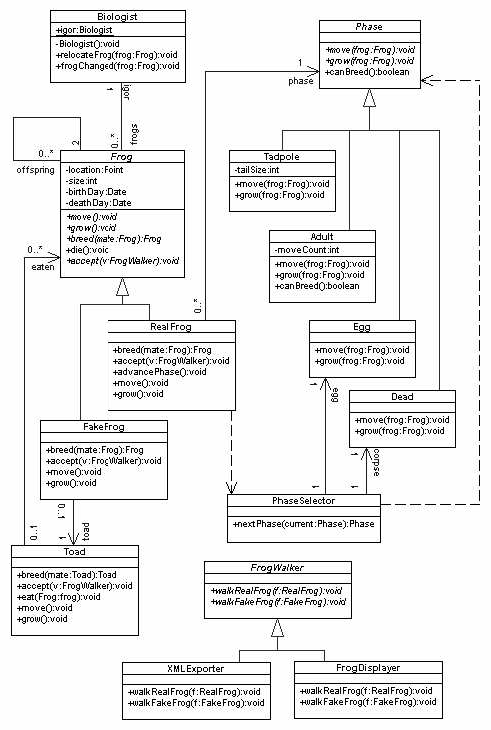Frogs second design
From CSSEMediaWiki
Revision as of 08:34, 7 October 2008 by Elliot Fisher (Talk | contribs)
Another OO model of frogs. This design appeared in the 2006 427 exam.
Design notes
Following criticism of the Frogs Design, the designer has studied design patterns and tried again.
- As before, this design models the lifecycles of Frogs.
- Getters and setters are omitted from the diagram, but may be assumed where necessary.
- There is one Biologist, Igor, who manages the Frogs. Igor moves around as required for experiments.
- There are many Frogs. The design minimises Frogs' knowledge of each other, instead using Igor to coordinate Frog behaviour. Whenever a Frog changes state, it tells Igor by calling frogChanged(), and Igor may choose to move() Frogs, or tell them to grow(), breed(), etc.
- A Toad can masquerade as a Frog, because Igor can’t tell the difference. FakeFrog makes a Toad conform to the type of Frog.
- Igor doesn’t eat Frogs any more, ever since he accidentally ate a Toad.
- A RealGrog can advancePhase() from an Egg to a Tadpole to an Adult to Dead by changing its Phase object.
- Phase objects are provided by a PhaseSelector. For every tadpole or adult Frog.
- PhaseSelector makes one Tadpole or Adult phase object. However, it uses a single Egg instance and a single Dead instance for all Frogs, because these two Phases don't need any data except birthDay and deathDay, which can be retrieved from Frog.
- A Frog can breed() to make offspring of the appropriate type.
- Tasks such as exporting XML and displaying Frog information are separated into FrogWalket subclasses. A Frog object can accept() a FrogWalker and call the WalkRealFrog() or WalkFakeFrog() method as appropriate for that Frog. It then tells offspring Frogs to accept the FrogWalker.
